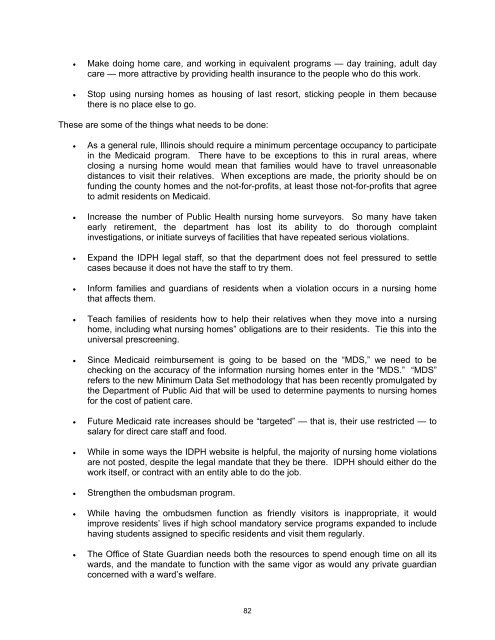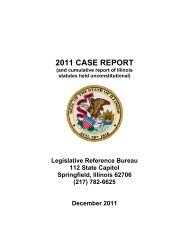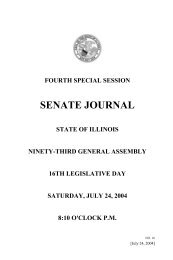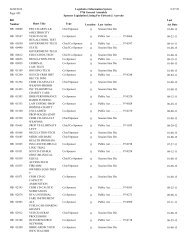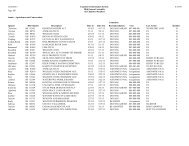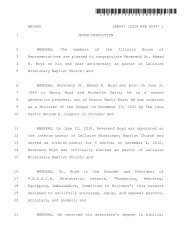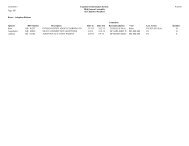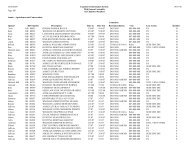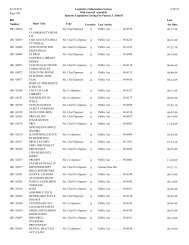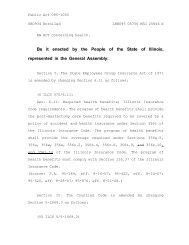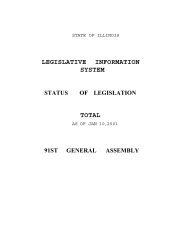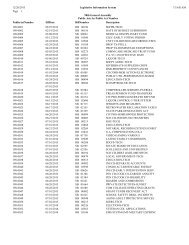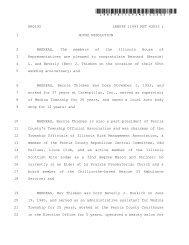Long-Term Care - Illinois General Assembly
Long-Term Care - Illinois General Assembly
Long-Term Care - Illinois General Assembly
Create successful ePaper yourself
Turn your PDF publications into a flip-book with our unique Google optimized e-Paper software.
• Make doing home care, and working in equivalent programs — day training, adult day<br />
care — more attractive by providing health insurance to the people who do this work.<br />
• Stop using nursing homes as housing of last resort, sticking people in them because<br />
there is no place else to go.<br />
These are some of the things what needs to be done:<br />
• As a general rule, <strong>Illinois</strong> should require a minimum percentage occupancy to participate<br />
in the Medicaid program. There have to be exceptions to this in rural areas, where<br />
closing a nursing home would mean that families would have to travel unreasonable<br />
distances to visit their relatives. When exceptions are made, the priority should be on<br />
funding the county homes and the not-for-profits, at least those not-for-profits that agree<br />
to admit residents on Medicaid.<br />
• Increase the number of Public Health nursing home surveyors. So many have taken<br />
early retirement, the department has lost its ability to do thorough complaint<br />
investigations, or initiate surveys of facilities that have repeated serious violations.<br />
• Expand the IDPH legal staff, so that the department does not feel pressured to settle<br />
cases because it does not have the staff to try them.<br />
• Inform families and guardians of residents when a violation occurs in a nursing home<br />
that affects them.<br />
• Teach families of residents how to help their relatives when they move into a nursing<br />
home, including what nursing homes” obligations are to their residents. Tie this into the<br />
universal prescreening.<br />
• Since Medicaid reimbursement is going to be based on the “MDS,” we need to be<br />
checking on the accuracy of the information nursing homes enter in the “MDS.” “MDS”<br />
refers to the new Minimum Data Set methodology that has been recently promulgated by<br />
the Department of Public Aid that will be used to determine payments to nursing homes<br />
for the cost of patient care.<br />
• Future Medicaid rate increases should be “targeted” — that is, their use restricted — to<br />
salary for direct care staff and food.<br />
• While in some ways the IDPH website is helpful, the majority of nursing home violations<br />
are not posted, despite the legal mandate that they be there. IDPH should either do the<br />
work itself, or contract with an entity able to do the job.<br />
• Strengthen the ombudsman program.<br />
• While having the ombudsmen function as friendly visitors is inappropriate, it would<br />
improve residents’ lives if high school mandatory service programs expanded to include<br />
having students assigned to specific residents and visit them regularly.<br />
• The Office of State Guardian needs both the resources to spend enough time on all its<br />
wards, and the mandate to function with the same vigor as would any private guardian<br />
concerned with a ward’s welfare.<br />
82


